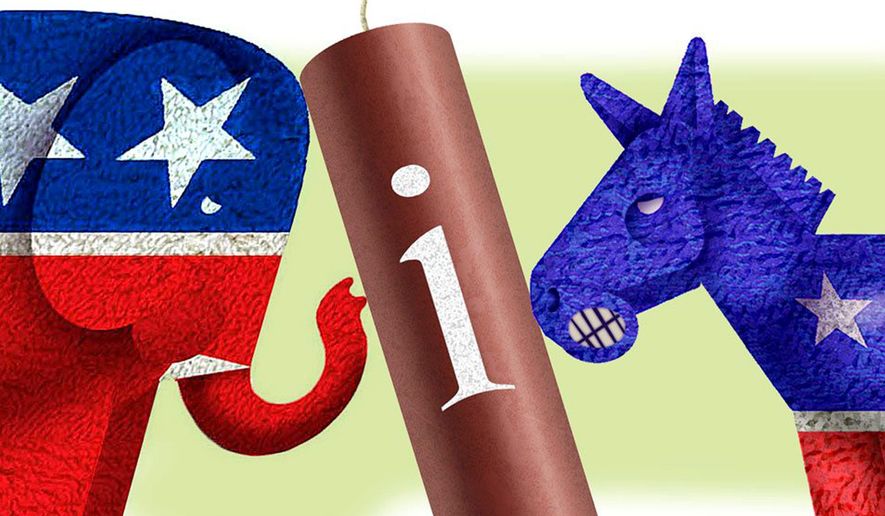OPINION:
Republicans, political strategists and pundits are beginning to notice that in almost every close Senate race in the country, there are one or more third-party or independent candidates on the ballot who could conceivably decide which major candidate will prevail in November and, consequently, whether Harry Reid’s Democrats will control the Senate for the next two years.
In most races, they won’t make much difference, but in some, the votes they siphon away from a major candidate could prove crucial. Most if not all of them appear to be Tea Party-type independents, libertarians or quasi-conservatives of one kind or another, so Republican candidates are rightly more worried about them. Whether that worry is justified is today the subject of some low-decibel debate within GOP ranks, but that could change if any of them begin to gain significant traction or attract substantial funds as November approaches.
In Kansas, of course, Democrats have abandoned their candidate and are trying to get him off the ballot to clear the way for “independent” Greg Orman, who may have a better shot at defeating incumbent Republican Pat Roberts simply because he isn’t a Democrat. Mr. Roberts and his party have their problems, but Kansas hasn’t elected a Democrat to the Senate since 1932, which has apparently convinced Kansas Democratic leaders that a change of clothes is in order.
Mr. Orman claims to be a true independent and has said he’ll caucus with whichever party wins control of the Senate, but he has a history of supporting Harry Reid and his buddies financially.
The Kansas situation is unique, but illustrates in extreme form the willingness of Democratic leaders to do whatever they think they must to win. Virginians will remember last year’s gubernatorial race in which a supposed “libertarian” third candidate named Robert Sarvis spent much of his time attacking the GOP nominee and supporting distinctly non-libertarian positions taken by the Democrat, who eventually won. It turned out that he received much of the last-minute money he got not just from libertarians or contrarian conservatives, but from Democrats who savored the chance to split the GOP and conservative vote in that race. Ultimately, the race was won by the Democrat with 48 percent of the vote while the Republican drew 45.5 percent and Mr. Sarvis took 6.6 percent. He didn’t get many votes, but could well have made the difference.
This year, candidates like Mr. Sarvis are running in a number of very close races. Some are Democrats in disguise, some are real libertarians or truly disgruntled conservatives, and few are perennial nutcakes, but a number of them could draw enough votes to sink Republican challengers in North Carolina, Georgia and Colorado if the races in those states remain close and the libertarian or independent candidates begin to get some traction.
Democrats know how to play this game. When Mr. Reid was preparing to run for re-election in Nevada four years ago, a “Tea Party” candidate filed and qualified for the ballot as an independent. The candidate himself was not a Reid ally, but it turned out that the treasurer of his committee, according to Nevada news reports at the time, was a lifelong Democrat and Reid supporter. The candidate’s viability collapsed when Republicans themselves nominated a Tea Partyer as their candidate, but had that not happened, many think Reid supporters would have poured money into his Tea Party candidate to split the GOP vote.
Most of the independent candidates running this year are sincere, but are in a position to be used by those willing to fund them for their own purposes. Mr. Reid’s allies have a number of super PACs out there with several million dollars available to be spent in support of Democrats, to demonize Republicans or to expand the ability of third candidates to cut into and split the Republican vote in key races.
Without such help, most of these candidates will pick up a percent or two of the vote on Election Day, but with real money spent on their behalf, could get 6 percent to 8 percent with most of it coming from those challenging Democratic control of the Senate. Most public polls don’t take these candidacies into account right now, but as we get closer to Nov. 4, it will become more and more obvious that some candidates few have yet heard of may hold the key to control of the U.S. Senate and to President Obama’s ability to implement his agenda during the final two years of his presidency.
Republicans, conservatives and libertarians who understand this had better be prepared to inform voters considering throwing their votes away on a candidate who can’t win just how serious the consequences of doing so could be this year.
David A. Keene is opinion editor of The Washington Times.




Please read our comment policy before commenting.